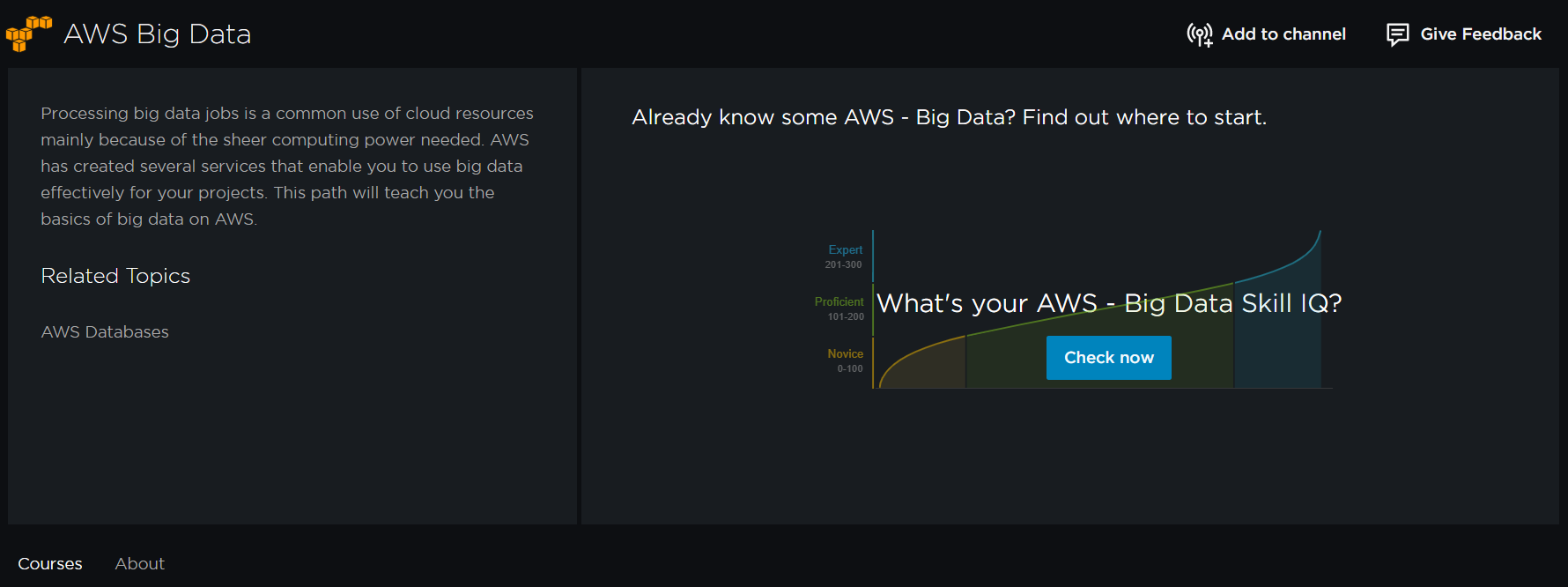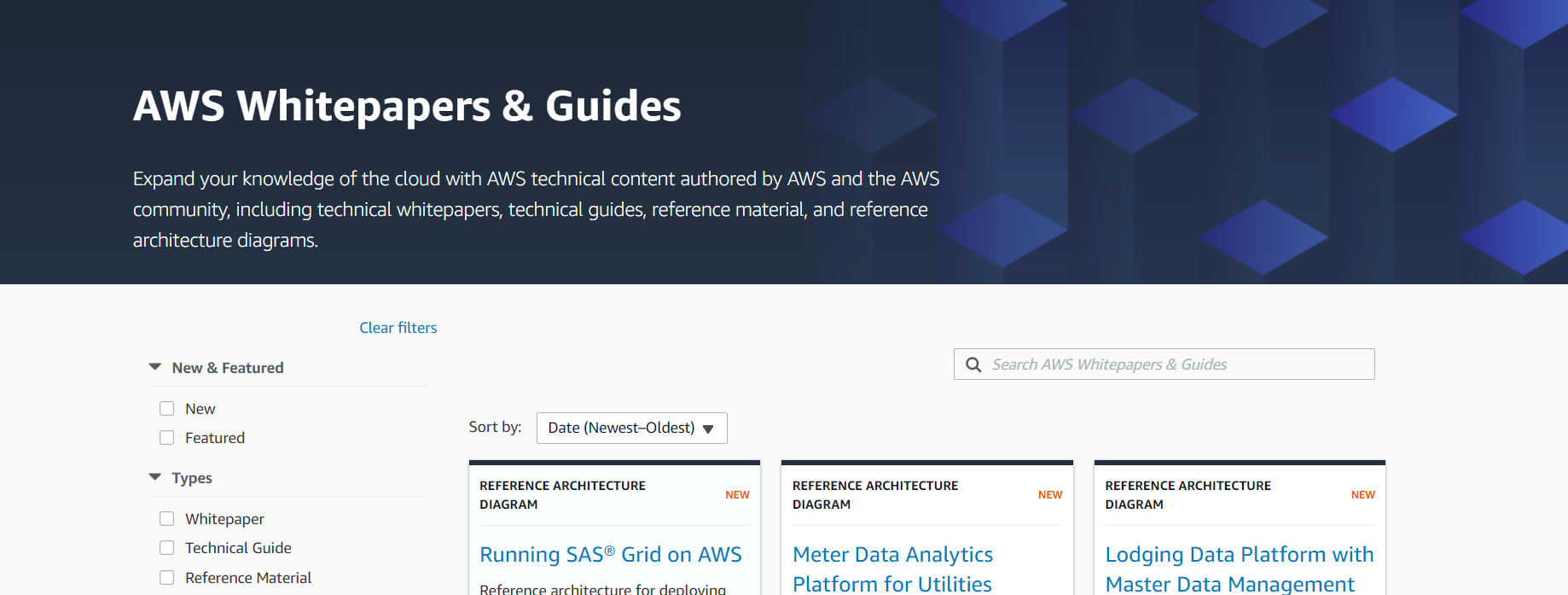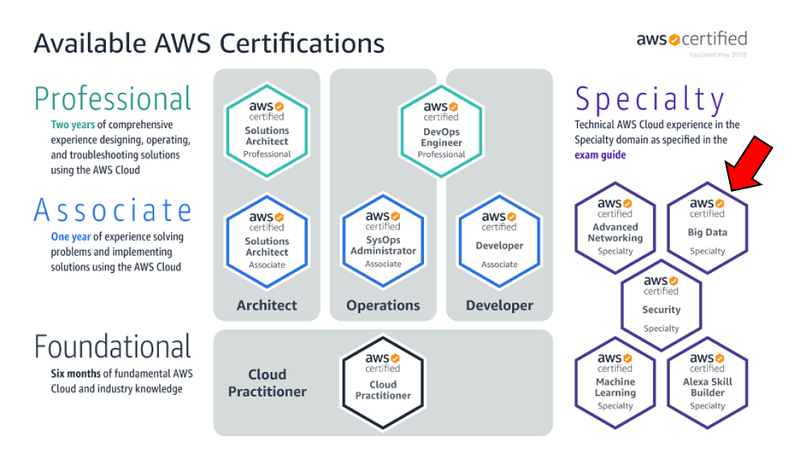Cloud Certifications: AWS Certified Data Analytics - Specialty
Oct 22, 2020 • 8 Minute Read
Introduction
This guide provides information and resources to prepare for the AWS Certified Data Analytics - Specialty certification (formerly known as AWS Certified Big Data – Specialty). It also gives you some tips and recommendations based on the experiences of other big data and analytics engineers who are certified in AWS.
Who This Certification Is For
This certification is designed and recommended for engineers who already have experience implementing big data platforms in AWS for analytics and processing, and who understand the wide range of services offered by this technology. Candidates are expected to understand and apply best practices and tools to each context.
This certification is recommended if you are a data engineer with experience executing machine learning or big data projects with AWS and know the concepts behind technologies like HDFS, Spark, Hadoop, etc.
What This Certification Is For
This certification is useful for many reasons, including:
- Demonstrating your experience applying AWS technologies in solving problems in analytics and big data projects.
- Increasing your knowledge in general topics of these technologies
- Understanding the path that the industry will follow in the coming years and how to focus your career
- Increasing your recognition in the industry in search of new job opportunities due to the high demand for professionals in this field
Applicable Exams
For this certification, you only need to take the AWS Certified Data Analytics - Specialty exam. This exam will assess your understanding of each stage of an analytics and big data project (independent of any particular industry/business), how to apply the best technology at each stage according to requirements and restrictions, minimizing problems and optimizing costs, and automation in implementation. You'll also be tested on how to develop machine learning models for use in a production environment.
Your preparation for the exam should look like this:
- Analyze and study the contents of the Pluralsight and AWS courses.
- After studying one of the technologies, practice with your own AWS account by creating and deleting resources and connecting them with other AWS services, so that you discover the steps and the configurations that you will have to do.
- If you can, you should take a practice exam. AWS offers practice exams with the same level of depth as the actual exam.
- Implement a complete analytics solution in your AWS account, working with both real-time and batch data.
Prerequisites
You can take this certification exam directly without taking another one before, but it would be helpful for you to take one from the Cloud Practitioner or Associate categories so that you can familiarize yourself with the types of questions you'll see and adapt to the format of the exam.
Because this certification focuses very heavily on technical details, you should have at least five years of work experience, and two to three years of experience implementing projects with the AWS technologies that you'll be tested on in this exam.
Skills Measured
Skills
The skills that will be measured during the exam are varied, but can consist of:
- Collecting data in batch, real time, and near-realtime processes
- Storage and data management
- Data processing, both at the file and database levels (SQL and NoSQL).
- Automating processes for all the aforementioned tasks while safeguarding the security of information, maintaining good practices, and ensuring high availability of systems
- Information analysis and visualization
- Implementing machine and deep learning models with AWS tools
- Selecting the best tools for each use case according to the restrictions and advantages of each one
In other words, you must have the ability to understand and practice throughout the life cycle of an analytics project.
Technologies
The technologies that you must understand and use to successfully complete the exam are:
-
AWS Kinesis
-
Simple Queue Service (SQS)
-
AWS Internet of Things (IOT)
-
AWS Database Migration Service (DMS)
-
Simple Storage Service (S3)
-
DynamoDB
-
AWS Lambda
-
AWS Glue
-
Elastic MapReduce, including Apache Spark, Hive, HBase, Presto, Zeppelin, Splunk, and Flume
-
TensorFlow
-
Amazon SageMaker
-
Kinesis Analytics
-
Amazon Elasticsearch Service
-
Amazon Athena
-
Redshift and Redshift Spectrum
-
Relational Database Service (RDS) and Aurora
-
Quicksight
-
KMS, HSM
-
IAM
-
Cognito
-
STS
As you can see there are many technologies you'll need to understand, so it could also be considered a prerequisite to have experience with these technologies and how they connect with each other.
Resources
Pluralsight Courses
Pluralsight has very good courses on each of the technologies mentioned, developed by experts in the industry. All the content relevant to this exam can be found here.
It would also be a good idea to follow Pluralsight's Architect path to study for this exam because it involves studying many technologies with a high level of detail, similar to what you will see in the Data Analytics exam.
Pluralsight Labs
Pluralsight has also created labs to help you practice the skills you need to obtain this certification.
AWS Whitepapers
AWS also has a repository of good practice documents and whitepapers with use cases and details of their technologies that can help you go deeper into the topics. You can find these here.
Compensation and Employment Outlook
The benefits of obtaining this certification include:
- Being able to participate in projects of high technical complexity related to issues of massive data processing.
- According to ZipRecruiter, the annual salary of someone with the AWS Certified Data Analytics - Specialty certificate on average reaches US $ 123,807, or more with additional experience and certifications.
- Recognition from the industry and your colleagues
- Direct benefits from AWS, such as discounts on practice tests or other certifications in addition to badges that you can use in your presentations, resumes, or other instances where you want to prove your experience.
- Qualification for better jobs; the certification is valid anywhere in the world.
The Certification Path
As mentioned previously in this guide, you could take this certification without having another one as a prerequisite. But if you have never taken a certification exam, it is recommended that you start with a not-so-complex exam (Associate, for example) so that you understand the dynamics of the exam.
Conclusion
Finally, some advice for your certification plan for the AWS Certified Data Analytics - Specialty certification:
- It's good to learn the technologies, but you should also focus on how they connect to each other on a global platform.
- Achieving this certification will mean taking a firm step in your professional career, wherever you want to develop.
- You should also study the good practices that AWS suggests for the use of its technologies, and understand various use cases for it.
Most importantly, if you pass this exam you should congratulate yourself. In addition to being highly valued in the industry, this achievement requires a lot of effort on your part that you should recognize.
I wish you a lot of success on your way to the AWS Data Analytics - Specialty certification!
Advance your tech skills today
Access courses on AI, cloud, data, security, and more—all led by industry experts.



